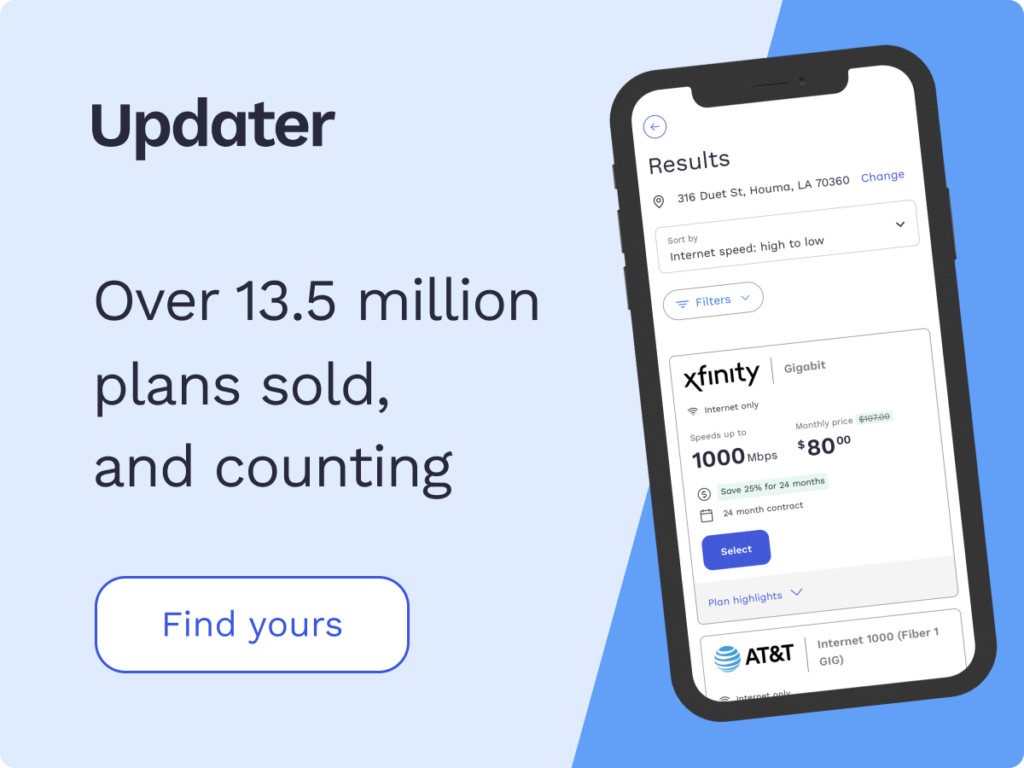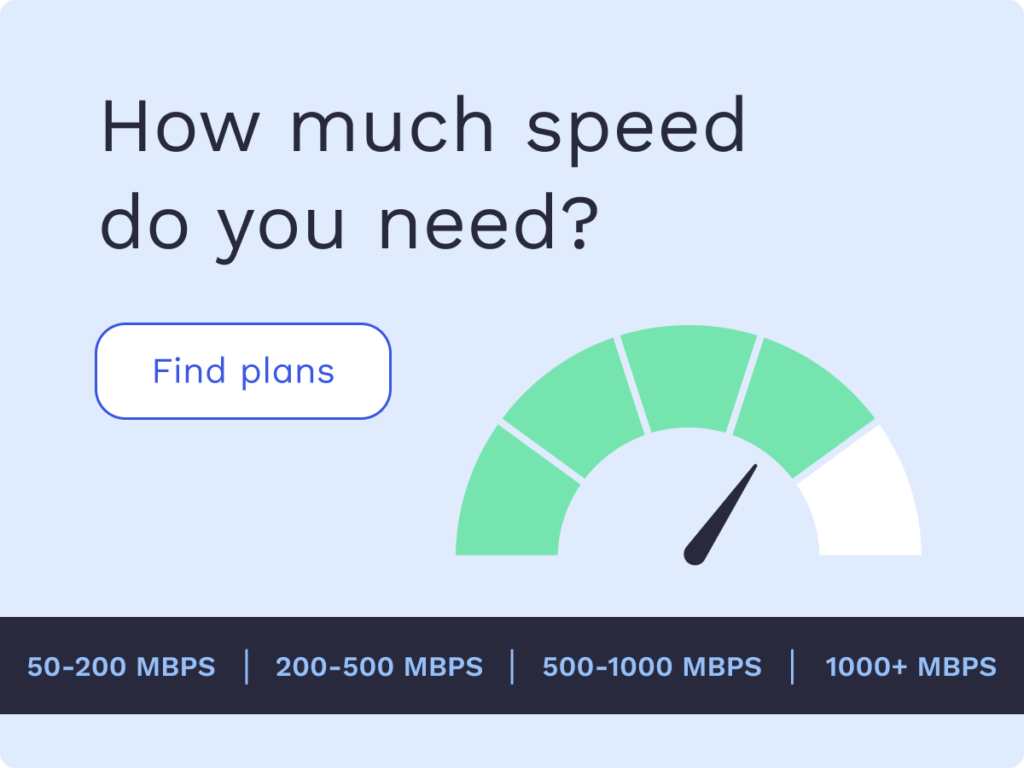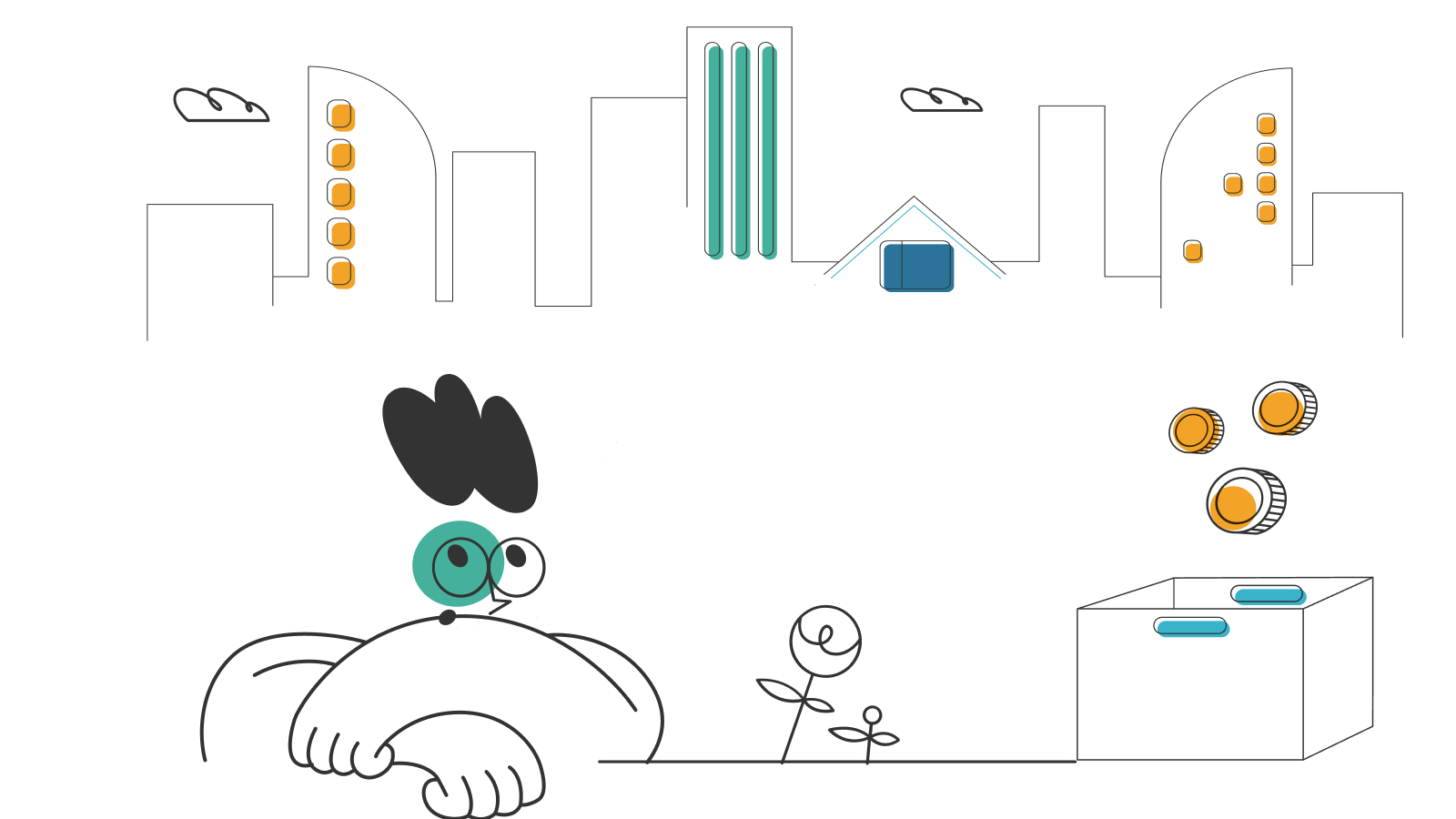Fastest Internet Providers

Whether you’re a 4K streamer, an at-home telecommuter with frequent Zoom meetings, or just have little patience for slow-loading pages, the speed of your internet matters. Even though internet technology has made it possible for most people to have access to high-speed internet, there can be vast speed differences between internet service providers (ISPs).
The question is, then, which ISPs offer the fastest internet? This guide takes a look at the fastest internet providers in general, the fastest providers by type of internet, and more helpful information for you to know as you search for speedy connectivity.
- Who are the fastest internet providers?
- Fastest internet providers by type of internet connection
- Considerations beyond speed
- How much speed do you need?
- Frequently asked questions (FAQs)
Who are the fastest internet providers?
So, which providers top the list as offering some of the fastest internet speeds available today?
AT&T Fiber
AT&T Fiber internet delivers up to 5000Mbps download and upload speeds for $180/month in select areas. This package is said to be best for people who want immersive internet experiences while gaming or streaming live content from their homes. This speed supports smart home gadgets, multiple connected devices, and several users. There are no data caps or contracts for new services with AT&T fiber internet plans. Plus, the ISP offers special perks from time to time, such as including HBO Max for free.
Xfinity
Xfinity is a cable internet provider, but their cable internet has gotten progressively faster over the last several years. The 1200Mbps plan is a good choice for unlimited devices, multiplayer gaming, and streaming, and for customers in the Western US it starts at just $70/month. The plan offers up to 1200Mbps download speed, but upload speeds are much more limited. In some areas, Xfinity may offer their Gigabit Pro plan for $300 per month, which offers up to 3000Mbps upload and download speeds. Xfinity does require a contract for new customers and has a data limit of 1.2TB in the Western and Central US.
Google Fiber
Google Fiber internet offers two straightforward plans: 1 Gig for $70/month and 2 Gig for $100/month. The faster of the two, the 2 Gig Google Fiber Plan, offers up to 2000Mbps download speeds and up to 1000Mbps of upload speed. According to Google, this is enough speed to support serious gamers and the smartest smart homes. Professional installation is free, you don’t have to sign a contract with a new service sign-up, and Google Fiber plans do not have data caps.
Verizon Fios
Verizon Fios has been the number-one pick for “Fast ISP” by PCMag 9 out of the last 10 years. The ISP’s Gigabit Connection plan, which is fiber internet, offers download speeds of 940Mbps and upload speeds of up to 880Mbps for $89.99/month. This premium plan supports online gaming and streaming on multiple devices simultaneously. Because of its fast upload speeds, the plan also works well for people who frequently need to upload large files, such as video content creators and remote workers. Plus, Verizon Fios does not have data caps and you can skip the setup charge by ordering services online.
Cox
Cox internet offers the Gigablast plan with 1000Mbps download speed and 35Mbps upload speed for $99.99/month. According to the cable-internet ISP, this speed supports up to nine devices, 8K streaming, working from home, and more. Cox internet plans are limited with a data cap of 1.25TB/month, so you will be charged $10 for every extra 50GB of data used. Also, Cox internet does require a contract, and prices for the Gigablast plan go up to $119/month after one year.
Spectrum
Spectrum offers cable internet with download speeds up to 1000Mbps, and their services are available in most of the US. The ISP also offers self-installation for free, no contract upon sign-up, and no data caps. The Internet Gig plan with 1000Mbps download and 35Mbps upload speeds starts at $89.99/month, but pricing is for the first 12 months of service and could change after that period.
CenturyLink
CenturyLink has a fairly broad coverage area with fiber internet plans that boast unlimited data. CenturyLink Fiber Gigabit internet is $65/month with no contract. The 940Mbps upload and download speed with this particular plan is fast enough to support streaming videos and music, playing online games, and more.
Sparklight
Sparklight is unique in that it offers a hybrid type of internet that involves both cable and fiber connections. However, the ISP’s Gigaone Flexible Plus plan offers up to 1000Mbps download speed and 50Mbps upload speed for $125/month with a 1500GB data cap. For an added $40/month, you can upgrade to unlimited data. Installation is free, and the provider says that the speed is enough to support up to 20 devices at one time.
Astound Broadband
Astound is one of the less-expensive options for fast home internet with either cable or fiber connectivity, even though they are a smaller ISP with limited availability. The provider has a 940Mbps internet plan that includes download speeds of up to 940Mbps, which the ISP states that this speed supports many users and devices. The base price—with no contract required—is $44.99/month for the first 12 months of service.
Fastest internet providers by type of internet connection
The type of internet connection significantly affects speeds. Simply put, certain connections types offer more bandwidth and are capable of transferring more data at a faster rate of speed. Therefore, certain ISPs naturally provide faster internet speeds because of the type of internet connection used.
Fiber and cable are currently the fastest types of internet connection available with download speeds that exceed 1000Mbps (1Gbps). However, fiber holds the top spot when it comes to upload speeds, which tend to be nearly the same as download speeds—something cable internet cannot yet provide. In fact, most cable ISPs have max upload speeds of between 3 and 25Mbps even with 1000Mbps download speeds.
The fastest internet providers according to the type of internet connection are:
- Cable – Xfinity offers up to 3000Mbps
- Fiber – AT&T Fiber offers up to 5000Mbps
- DSL – Kinetic by Windstream offers up to 232Mbps
- Satellite – Starlink offers up to 500Mbps
- Cellular/Mobile – T-Mobile offers 162.3Mbps on average
Considerations beyond speed
Speed is important when it comes to selecting the right ISP. However, you may want to consider a few other factors that could affect overall satisfaction with your services, such as latency, cost, data caps, and more.
Latency
Data latency is a phrase used in reference to how long it takes for packets of data to travel from one point to another. You can have excellent speeds but still experience problems with high latency. For example, you may be getting an average speed of 100Mbps, but the latency for that data to show up is 200 milliseconds (ms). Therefore, even though the data is being sent quickly, there is a high latency period before the data shows up. Latency can be an issue when data has to travel a long distance between the points of communication, such as your home network and the ISP terminal.
Cost
Cost is always an important factor to consider when it comes to high-speed internet. Unfortunately, not all customers have access to a myriad of options when it comes to home internet. However, if you do, it can be important to weigh the cost of different speeds between ISPs. For example, you may have access to Google Fiber and Verizon Fios in your area. Google Fiber’s 1 Gig plans are $70/month, and Verizon Fios’s Gigabit Connection is $89.99/month.
Additional fees and charges
Depending on the provider, you may be responsible for additional fees and charges beyond your monthly internet fees. For example, some providers will require that you use their routers in order to ensure you have equipment capable of supporting high-speed internet connectivity. If this is the case, you may have to rent a router from the ISP for an additional fee every month. Likewise, some ISPs charge installation fees and fees for overages beyond data limits.
Data caps
It can be great to have high-speed internet, but not every ISP offers unlimited data. For example, if you sign up for one of the higher-speed plans through Xfinity, you may have a data-usage limit of 1.2TB (terabytes) of data. While Xfinity will not slow your speeds if you exceed your limit, you will be charged $10 for every extra 50GB of data that you use up to a maximum of $100 per month.
Internet throttling
In some cases, ISPs practice internet throttling, which means speeds may be slowed when there is higher data traffic on the connection. For example, if you have DSL, the bandwidth in your area may be shared with your neighbors. Therefore, your speeds may be throttled during the hours when the internet is being used heavily by a large number of people and/or devices.
How much speed do you need?
The differences between how much speed a household actually needs vary drastically depending on how the internet is used. For example, a single person who only uses the internet to look things up as-needed is not going to need as much speed as someone who streams from Netflix on multiple devices or plays online games.
According to the Federal Communications Commission (FCC), any speed over 25Mbps is considered “advanced service” that is fast enough to support high-demand applications. However, CNET points out that if you use the internet daily, have smart home gadgets, and stream content, you will likely need to have closer to 100Mbps.
Different internet activities require different speeds. Here is a quick chart to give you an understanding of what speeds may be needed for different activities online.
Frequently asked questions (FAQs)
Why are speeds sometimes different than what an ISP advertises?
Quite a few factors affect the amount of speed you actually experience versus the speed advertised by the ISP. Some factors are within your control, such as if you have a lot of devices connected or multiple processes being carried out online at one time. Other factors are related to the actions of the ISP or how service is provided. For example, if you are on a DSL connection, you may be sharing bandwidth with your neighbors. Therefore, during high-internet-usage times, you may get less speed than what was advertised when you signed up.
Which matters most, upload or download speed?
Upload speed is a reference to how quickly data is sent from your network, while download speed refers to how quickly data is delivered to your network. Therefore, in most situations, download speed will be more important, but both should be considered when determining the right speed for your household.
For example, during internet activities that require data to be sent, such as video calls or online gaming, lower upload speeds will slow down data transfers and may generate issues with lag. Low upload speeds can also be problematic if you do live-streaming or create your own YouTube videos.
How can you test your internet speed?
If you currently have an ISP, it can be helpful to periodically check the speeds you are getting. Several free resources make testing your internet speed simple, such as Google and speedof.me. Both will provide average upload and download speeds, as well as a latency measurement. If you frequently find that your speed is much lower than what you expect, it may be helpful to discuss your concerns with your ISP to determine exactly what is affecting the rate of data transfer at your location.
*Pricing varies by location and availability. Speeds may vary. All prices subject to change; for current pricing and availability visit our internet service page. Prices as of 3/28/22.
Disclosure | Updater articles are based on our own data and research, independent from partner relationships. We are not compensated by partners for information and opinions presented here. Our Editorial Terms of Service can be found here.














